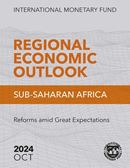This web page provides information on the activities of the Office, views of the IMF staff, and the relations between Rwanda and the IMF. Additional information can be found on Rwanda and IMF country page, including official IMF reports and Executive Board documents in English that deal with Rwanda.
At a Glance
- Rwanda joined the Fund in Joined: September 30, 1963
- Total Quotas: SDR 80.1 Million
- Loans outstanding: Poverty Reduction and Growth Facility (PRGF) arrangements SDR 9.72 million
- Last Article IV Consultation: 2014 Article IV Consultation and Second Review Under the Policy Support Instrument, (Country Report No. 14/343)
Office Activities
-
Recruitment Notice of an Office Manager in the Kigali office.
Interested candidates who match the criteria above are requested to send their CVs, along with cover letters to rr-rwa@imf.org no later than March 3, 2023.
February 17, 2023
-
IMF’s Abebe Aemro Selassie on Investment and Sustainable Debt Management in Africa
CNBC Interview
August 1, 2019
IMF's Work on Rwanda
-
Growth in Sub-Saharan Africa is Diverging
November 14, 2024
Stagnating incomes in sub-Saharan Africa’s resource-intensive economies necessitate more effective fiscal management and broad-based structural reforms.
-
October 22, 2024
From October 7 to October 20, 2024, an International Monetary Fund (IMF) team, led by Ruben Atoyan, discussed with the authorities’ policy priorities and progress on reforms within the context of the fourth reviews of Rwanda’s Policy Coordination Instrument (PCI) and Resilience and Sustainability Facility (RSF), and the second review of the Stand-by Credit Facility (SCF) arrangement
-
The Evolving Role of Central Banks in Africa
June 7, 2024
Central banks need to be on their toes and be ready to make bold moves in the coming years. It will be about being practical, accepting trade-offs, learning lessons from around the globe, and acting on them. Moreover, it will be crucial to keep central banks as free from political strings as possible.
-
May 28, 2024
Series:Country Report No. 2024/141
-
May 22, 2024
The Executive Board of the International Monetary Fund (IMF) concluded the third reviews under the Policy Coordination Instrument (PCI) and the arrangement Under the Resilience and Sustainability Facility (RSF), and first review under the Standby Credit Facility (SCF) arrangement with Rwanda
Regional Economic Outlook
October 25, 2024
Sub-Saharan African countries are implementing difficult and much needed reforms to restore macroeconomic stability, and while overall imbalances have started to narrow, the picture is varied. Policymakers face three main hurdles. First, regional growth, at a projected 3.6 percent in 2024, is generally subdued and uneven, although it is expected to recover modestly next year to 4.2 percent. Second, financing conditions continue to be tight. Third, the complex interplay of poverty, scarce opportunities, and weak governance--compounded by a higher cost of living and short-term hardships linked to macroeconomic adjustment--are fueling social frustration. Within this environment, policymakers face a difficult balancing act in striving for macroeconomic stability while also working to address development needs and ensure that reforms are socially and politically acceptable. Protecting the most vulnerable from the costs of adjustment and realizing reforms that create sufficient jobs will be critical to mobilize public support.
Read the Report
Fraudulent Scam Emails Using the Name of the IMF
We would like to bring to the notice of the general public that several variants of financial scam letters purporting to be sanctioned by the International Monetary Fund (IMF) or authored by high ranking IMF officials are currently in circulation, and may appear on official letterhead containing the IMF logo. The scam letters instruct potential victims to contact the IMF for issuance of a “Certificate of International Capital Transfer” or other forms of approval, to enable them receives large sums of monies as beneficiaries. The contact e-mail information is always BOGUS and unsuspecting individuals are then requested to send their personal banking details which the scammers utilize for their fraudulent activities.For more information please see Fraudulent Scam Emails Using the Name of the IMF
African Departmental Papers





